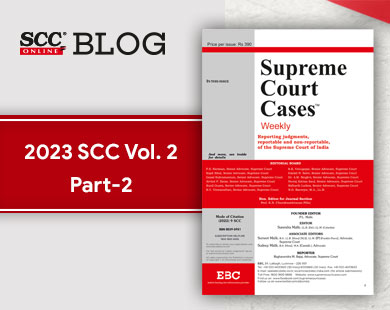Constitution of India — Art. 14 — Right to equality — Reasonable accommodation of disabled or differently-abled persons — Requirement of: There are two facets of right to equality : Formal equality and substantive equality. Formal equality means that every person, irrespective of attributes must be treated equally and must not be discriminated, while substantive equality is aimed at producing equality of outcomes through different modes of affirmative action. Reasonable accommodation, held, one of the means for achieving substantive equality, pursuant to which disabled persons must be reasonably accommodated based on their individual capacities. Disability as social construct precedes medical condition of individual. Sense of disability introduced because of absence of access to facilities. [Ravinder Kumar Dhariwal v. Union of India, (2023) 2 SCC 209]
Constitution of India — Art. 144 — Compliance with orders of Supreme Court by High Court — Necessity of: In case of Supreme Court’s order to High Court to place before Supreme Court suggestions and road map formulated by High Court for early disposal of commercial disputes. Suggestions and road map formulated by High Court, held, should have been necessarily placed before Supreme Court well in advance so as to enable Supreme Court to pass further orders and directions. [Chopra Fabricators & Manufacturers (P) Ltd. v. Bharat Pumps & Compressors Ltd., (2023) 2 SCC 325]
Consumer Protection — Services — Carriers/Transporters: Mistake/Negligence in making forwarder cargo receipt (FCR), as in the present case by recording wrong loading port, leading to non-honouring of letter of credit if can considered, as deficiency of service, explained. [Bawa Paulins (P) Ltd. v. UPS Freight Services (India) (P) Ltd., (2023) 2 SCC 330]
Criminal Trial — Circumstantial Evidence — Generally — Proving case based on circumstantial evidence: Principles reiterated regarding matters to be established for proving case based on circumstantial evidence. [Ram Pratap v. State of Haryana, (2023) 2 SCC 345]
Education Law — Professional Colleges/Education — Medical and Dental Colleges — Admission — Admission procedure — Entrance examination/Common entrance examination/NEET: In this case it was held that it was the fault of examiners causing injustice, prejudice to candidate and candidate was not at fault. Relief of re-examination/fresh examination, not being practical, declined. However, as authorities had taken adequate steps to redress the grievance, petition disposed of accordingly. [National Testing Agency v. Vaishanavi Vijay Bhopale, (2023) 2 SCC 322]
Penal Code, 1860 — S. 302 — Death sentence: Principles for imposition of death sentence, surveyed in detail. Practical guidelines framed for collection/collation of mitigating circumstances. [Manoj v. State of M.P., (2023) 2 SCC 353]
Practice and Procedure — Expeditious/Time-bound disposal: A Special Arrears Committee of Judges of Allahabad High Court was constituted to tackle with problem of arrears of commercial matters. Only Judges from Allahabad Bench are in Committee. None of Judges from Lucknow Bench is part of Committee. Committee directed to be reconstituted so that they may have further suggestions from Lucknow Bench also as there are large number of pending commercial matters within jurisdiction of Lucknow Bench. [Chopra Fabricators & Manufacturers (P) Ltd. v. Bharat Pumps & Compressors Ltd., (2023) 2 SCC 327]
Right to Fair Compensation and Transparency in Land Acquisition, Rehabilitation and Resettlement Act, 2013 — S. 24(2) — Lapse of acquisition proceedings: In this case, there were allegation of non-payment of compensation and dispute regarding possession of land. Records indicating possession of land taken by authorities by following procedure laid down under the Land Acquisition Act, 1894. Hence held, as possession was taken land vests with State and alleged possession of original landowners of the said land thereafter is illegal. Acquisition proceedings under the 1894 Act, held, did not lapse. [State (NCT of Delhi) v. Ram Prakash Sehrawat, (2023) 2 SCC 348]
Rights of Persons with Disabilities Act, 2016 — Ss. 2(r), (s), (m), (y), 3, 17(i), 18, 31 to 37, Chs. III, VI and Sch. Entry 2(a) — Right to inclusive education: The right to inclusive education is realised through the provision of reasonable accommodation. Reasonable accommodation is at the heart of the principle of equality and non-discrimination espoused under the RPwD Act, 2016. The denial of reasonable accommodation to a PwD amounts to discrimination. It is the positive obligation of the State to create the necessary conditions to facilitate the equal participation of disabled persons in society. [Avni Prakash v. National Testing Agency, (2023) 2 SCC 286]







